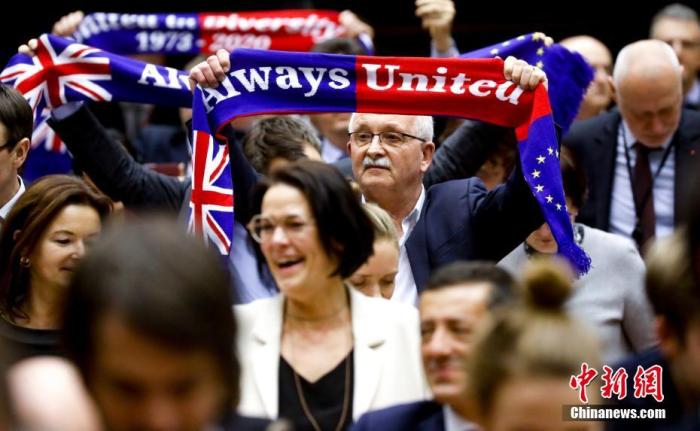China News Service, April 29. According to Reuters' Chinese website, the European Parliament overwhelmingly supported the post-Brexit trade agreement between the United Kingdom and the European Union. It cleared the last obstacle to the approval of the agreement, but at the same time made it clear to the British government. Expressed distrust.
Data map: On January 29, 2020 local time, the European Parliament approved the "Brexit" agreement.
The picture shows the parliamentarians holding high the banner of "Forever Unity" after the voting.
China News Agency issued photos for EU
The European Parliament announced on the 28th that the previous day’s vote with 660 votes in favor, 5 votes against, and 32 abstentions passed the Trade and Cooperation Agreement (TCA).
This puts an end to four years of intense negotiations and disputes surrounding Brexit, but there is still a sense of mistrust between the two sides.
European Commission President Von der Lein said that she welcomes the result of the vote, "TCA is the foundation of the strong and close partnership between the European Union and the UK, and the faithful implementation of this agreement is vital.
British Prime Minister Johnson said this week is the last step of a long journey, providing stability to the new relationship between Britain and the European Union.
He said in a statement: "Now is the time to look to the future and build a more globalized Britain."
However, according to reports, many MPs also voted for an accompanying resolution in which they called Brexit a "historic mistake."
The text of the resolution talked about the limited scope of the trade agreement, and the UK's economic opportunities based on the service industry were "substantially reduced."
The lawmakers condemned the UK for unilaterally changing the trade arrangements in Northern Ireland and urged the European Commission to continue to take legal action.
They also warned the European Union to be vigilant against British actions in taxation and fisheries.
The UK left the EU in January 2020, but remained in the EU single market until early 2021.
The agreement reached between the UK and Europe in December 2020 ensures zero tariffs and quotas, but adds inspection paperwork that hinders trade.
Britain’s exports to the EU fell by 47% from January to February 2021, and imports fell by 20%, far exceeding the decline of any other EU trading partner.

